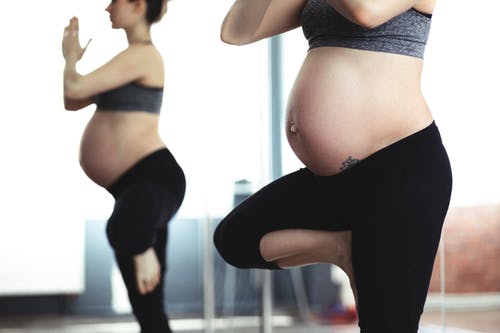Author: Magnolia Potter
Being pregnant doesn’t mean that you have to spend nine months glued to the couch with your feet propped up. In fact, incorporating safe exercises into your routine can make both you and your baby healthier and happier during the pregnancy.
Plus, if you already have an exercise routine, it will be that much easier to lose those pregnancy pounds after you deliver and practice healthy habits down the road.
Read on to learn more about the benefits of strength training while pregnant. Know that learning about the effects of inactivity or unsafe exercise during pregnancy is important when making your pregnancy plan, as is becoming familiar with safe weight training techniques.

A healthy pregnancy is about more than eating right and resting. Incorporating regular exercise into your routine will have huge positive impacts on both you and your baby. When you practice safely and perform exercise that target areas of your body that are most affected your pregnancy, you’ll be happier, healthier, and more comfortable throughout the entire process.
Benefits of Exercising While Pregnant
The benefits of exercising during your pregnancy are endless. It’s practically essential to exercise regularly in order to have a healthy pregnancy. Not only can exercise improve your mood and improve a wide variety of health factors, it can also help prevent and treat the undesirable side effects of pregnancy.
Things like poor circulation and varicose veins are present in the pregnancies of many women. The good news is that regular exercise can help treat varicose veins by getting your blood flowing through movement. It can also help improve your energy levels and lessen the effects of fatigue and nausea by releasing endorphins into your system.
If you’re not yet convinced that exercise is essential, consider that regular exercise is conducive to a healthy pregnancy, along with adhering to the following practices:
- Use natural cleaning products and throw toxic ones in the trash
- Hydrate thoroughly throughout the day
- Prioritize getting enough sleep
- Eat healthy food regularly and avoid toxins
- Educate yourself on pregnancy and its effects
- Take time to relax and rejuvenate
- Avoid caffeine
None of these things need to be major lifestyle overhauls. Chances are, a few slight shifts in your routines and habits can make a huge difference on the health of you and your baby, and your habits that will follow delivery and your life after.
Starting slow and small is the key to making these changes last. Instead of trying to do everything at once, choose one thing at a time to focus on and build as that new thing eventually becomes a habit.
Pregnancy Risks of Inactivity or Unsafe Exercise
Whether you tend to be more of an athlete or a couch potato, pregnancy is one of the most important times to develop or maintain a solid exercise routine. Your mind and your body will thank you.
“Strengthening your abdominal and back muscles can help prevent the lower back pain that’s common during pregnancy,” according to Baby Center. “Weight training helps you build stamina, which you need during labor and delivery. Strength training throughout pregnancy can also help you keep your weight gain within a healthy range for your body.”

It’s clear that activity is very important while you’re pregnant, but developing healthy habits could be just as, if not more, important after you deliver as well — especially if you have a child with special needs.
For example, “One in every 365 African-American babies is born with Sickle Cell Disease,” according to Regis College. “In contrast, one in every 16,300 Hispanic-American babies is diagnosed with the disease.” With thousands of babies diagnosed with genetic disorders every year, it’s valuable to note that regular exercise could reduce complications of the condition, making it easier for both mothers and kids to thrive.
With all this talk about the importance of exercise and activity, it’s vital to remember to respect your limits and be careful when exercising. Training safely and building slowly is the way to go. You want a practice that’s regular and sustainable — not one that’s erratic and leaves you tired for days after.
Safe Strength Training Practices
Safe strength training practices are essential whenever you exercise, but even more so when you’re pregnant. After all, you’re not only looking after your own health but also the health of your baby. The last thing you want is an accident or injury that could have been avoided.
First things first: You’ll always want to consult your doctor to get the go-ahead before starting a strength training regimen. Always stay within your limits and choose appropriate exercises. Utilizing simple bodyweight exercises, sticking to weights under 30 pounds, and avoiding prone positions are great rules to go by.
By following the best weight training practices for pregnancy, you can target your strength training on areas that will need extra help while you’re carrying your baby — like your back, shoulders, and chest — and stay safe and healthy while doing it.
According to Parents magazine, some of the best exercises you can do include the seated cable row, lat pulldown, seated chest press, leg extension, seated leg curl, plank, and bicep and tricep work. Doing these exercises regularly should help reduce the aches and pains that often go along with pregnancy. The more you can do to make yourself more comfortable and reduce stress on you and your baby, the better.
If you’re someone who doesn’t normally exercise, getting into it while pregnant doesn’t have to be intimidating. Something as simple as walking or swimming can be hugely beneficial. If you’re unsure about strength training, consider working with a professional who can guide you exercise by exercise and spot you until you gain the confidence you need to practice on your own.
Pregnancy is a great time to focus on self-care and self-improvement. Practicing pregnancy-specific exercises through safe strength training is one of the best things you can do for yourself to ensure a smooth and healthy pregnancy and delivery.
***sponsored post***subscribe***











More Stories
Aerobics for Beginners
What is Perimenopause & How to Cope
Breast Lift With These Chest Workout Routine For Women